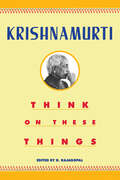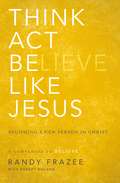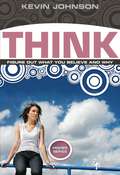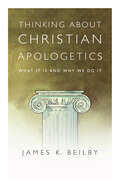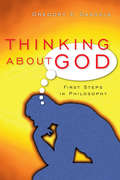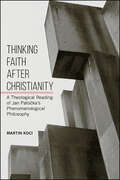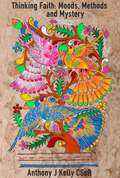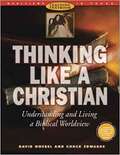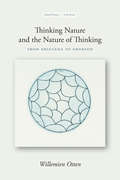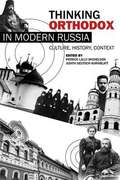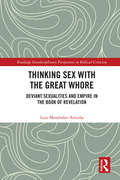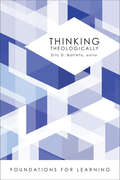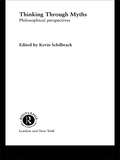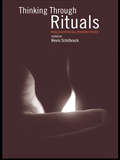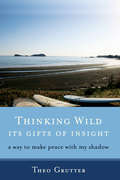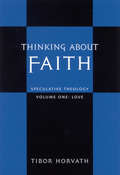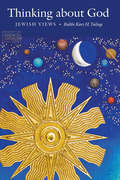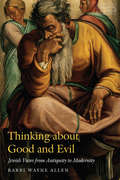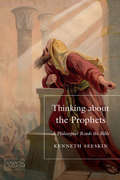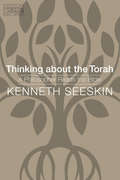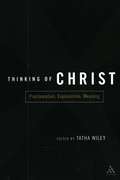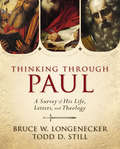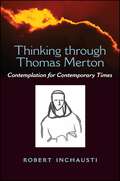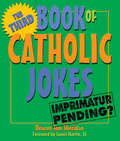- Table View
- List View
Think on These Things
by Jiddu Krishnamurti‘The material contained in this volume was originally presented in the form of talks to students, teachers and parents in India, but its keen penetration and lucid simplicity will be deeply meaningful to thoughtful people everywhere, of all ages, and in every walk of life. Krishnamurti examines with characteristic objectivity and insight the expressions of what we are pleased to call our culture, our education, religion, politics and tradition; and he throws much light on such basic emotions as ambition, greed and envy, the desire for security and the lust for power – all of which he shows to be deteriorating factors in human society.’From the Editor’s Note‘Krishnamurti’s observations and explorations of modern man’s estate are penetrating and profound, yet given with a disarming simplicity and directness. To listen to him or to read his thoughts is to face oneself and the world with an astonishing morning freshness.’Anne Marrow Lindbergh
Think, Act, Be Like Jesus: Becoming a New Person in Christ
by Randy Frazee Robert NolandThe Bible teaches that the goal of the Christian life is to become like Jesus—for our own personal growth and for the sake of others. Every believer needs to ask three big questions: What do I believe? What should I do? And who am I becoming? In Think, Act, Be Like Jesus, bestselling author and pastor Randy Frazee helps readers grasp the vision of the Christian life and get started on the journey of discipleship. After unfolding the revolutionary dream of Jesus and showing how our lives fit into the big picture of what God is doing in the world, Frazee walks readers through thirty short chapters exploring the ten core beliefs, ten core practices, and ten core virtues that help disciples to think, act, and be more like Jesus Christ. This compelling new book can be used in conjunction with the 30-week all-church Believe campaign or read separately as an individual study. Either way, readers will deepen their understanding of what it means to not just know the Story of God, but to live it.
Think: Figure Out What You Believe and Why (Higher Series)
by Kevin Johnson"One of the most challenging parts of following Jesus is being able to explain the what’s and why’s of your faith. Whether a friend’s questions stump you or you’re having doubts of your own, it helps to know what you believe and why. There’s no need to be afraid to ask the tough questions. When it comes to your faith, there’s no such thing as a dumb question and no topic should be off-limits. God wants you to understand your faith so you can help others understand it, too. In Think, you’ll find 20 straightforward studies that explore what the Bible says about controversial and difficult topics. You’ll discover why the Bible is worth believing, you’ll find out how you can be sure Jesus was more than a nice guy and good teacher, and you’ll see that the Bible really does have relevant things to say about life today. God wants to give you solid reasons to believe, along with the know-how to explain your faith without sounding intolerant or arrogant. So dig in and be sure about what you believe."
Thinking About Christian Apologetics: What It Is and Why We Do It
by James K. BeilbyThinking About Christian Apologetics
Thinking About God: First Steps in Philosophy
by Gregory E. GanssleCan we really think about God? Can we prove God?s existence? What about faith? Are there good reasons to believe in the Christian God? What about evil? Can we really know with our finite minds anything for sure about a transcendent God? Can we avoid thinking about God? The real problem, says philosopher Gregory E. Ganssle, is not whether we can think about God, but whether we will think well or poorly about God. Admittedly there is a lot of bad thinking going around. But Ganssle, who teaches students, wants to help us think better, especially about God. He thinks philosophy can actually help. In the first part of this book Ganssle lays the groundwork for clear and careful thinking, providing us an introductory guide to doing philosophy. In the second part Ganssle then takes us through the process of thinking well about God in particular. He asks us to consider whether there are good reasons to believe that God exists. He thinks there are! In a third part Ganssle addresses the thorny issue of the existence both of God and of evil. He thinks there?s a valid way through this problem. In the final part Ganssle helps us thread our way through questions like: What is God like? What can God do? What can God know? How does God communicate? He thinks that there are some clear answers to these questions, at least if you?re talking about the God of Christianity. If you're looking for your first book for thinking clearly and carefully about God, then you'll appreciate the good thinking found in this book.
Thinking Faith after Christianity: A Theological Reading of Jan Patočka's Phenomenological Philosophy (SUNY series in Theology and Continental Thought)
by Martin KociWinner of the 2020 Emerging Scholar’s Theological Book Prize presented by the European Society for Catholic TheologyThis book examines the work of Czech philosopher Jan Patočka from the largely neglected perspective of religion. Patočka is known primarily for his work in phenomenology and ancient Greek philosophy, and also as a civil rights activist and critic of modernity. In this book, Martin Koci shows Patočka also maintained a persistent and increasing interest in Christianity. Thinking Faith after Christianity examines the theological motifs in Patočka's work and brings his thought into discussion with recent developments in phenomenology, making a case for Patočka as a forerunner to what has become known as the theological turn in continental philosophy. Koci systematically examines his thoughts on the relationship between theology and philosophy, and his perennial struggle with the idea of crisis. For Patočka, modernity, metaphysics, and Christianity were all in different kinds of crises, and Koci demonstrates how his work responded to those crises creatively, providing new insights on theology understood as the task of thinking and living transcendence in a problematic world. It perceives the un-thought element of Christianity—what Patočka identified as its greatest resource and potential—not as a weakness, but as a credible way to ponder Christian faith and the Christian mode of existence after the proclaimed death of God and the end of metaphysics.
Thinking Faith: Moods, Methods and Mystery
by Anthony J. KellyThe title of this collection of essays is Thinking Faith: Moods, Methods, and Mystery, and it might need a word of explanation. The aim is to suggest something of what is involved in thinking faith, while indicating examples of my modest contribution over all these years. Given the exuberant data of faith, beliefs, doctrines and tradition, the task of the theologian is always to reflect on what is so richly given, and to communicate in the most telling fashion its meaning. There are certainly moods that colour the way we think, even though theological writing must show an intellectual concentration of some kind. That is quite compatible with a great variety of approaches, sometimes more hopeful, sometimes more sober, defensive and argumentative. There is also the question of methods. The strange thing about a particular theological method or style of thought is that it is seldom an explicit series of procedures. It is something more spontaneous and formed through the practices of many years. Quite clearly, in this collection of writings a number of methods is implied. Whatever the mood, whatever the method, the mystery remains-of God, Christ, and who we are in that light. To this degree, theology is a way of thinking within mystery, not outside it. In this respect, doing theology is humbling for us theologians when confronted with the limited span of our knowledge-and our poor capacities to express it. There always remain infinite expanses of what is not yet given us to see, so to leave theologians, inarticulate, in splendid defeat. And yet so much has been given, even in the most routine life of the Church, in its Scriptures its sacraments, and in the luminous witness of the many who have gone before us, and live now in the light.
Thinking Like a Christian: Understanding and Living a Biblical Worldview (Worldviews in Focus)
by Chuck Edwards David A. NoebelFrom TV news to public school classrooms, secular ideas are presented as 'the way to think'-sophisticated and scientific, contemporary and aware. Even though they're infected with an array of false assumptions. Yet Christians too easily succumb because they don't understand how remarkable it is to view the world from a biblical perspective. <p><p> Designed to build a young person's assurance that a Bible-based worldview makes sense. Includes CD-ROM Leader's Guide.
Thinking Nature and the Nature of Thinking: From Eriugena to Emerson (Cultural Memory in the Present)
by Willemien OttenA fresh and more capacious reading of the Western religious tradition on nature and creation, Thinking Nature and the Nature of Thinking puts medieval Irish theologian John Scottus Eriugena (810–877) into conversation with American philosopher Ralph Waldo Emerson (1803–1882). Challenging the biblical stewardship model of nature and histories of nature and religion that pit orthodoxy against the heresy of pantheism, Willemien Otten reveals a line of thought that has long made room for nature's agency as the coworker of God. Embracing in this more elusive idea of nature in a world beset by environmental crisis, she suggests, will allow us to see nature not as a victim but as an ally in a common quest for re-attunement to the divine. Putting its protagonists into further dialogue with such classic authors as Augustine, Maximus the Confessor, Friedrich Schleiermacher, and William James, her study deconstructs the idea of pantheism and paves the way for a new natural theology.
Thinking Orthodox in Modern Russia
by Patrick Lally Michelson Judith Deutsch Kornblatt"Thinking Orthodox in Modern Russia" illuminates the significant role of Russian Orthodox thought in shaping the discourse of educated society during the imperial and early Soviet periods. Bringing together an array of scholars, this book demonstrates that Orthodox reflections on spiritual, philosophical, and aesthetic issues of the day informed much of Russia's intellectual and cultural climate. Volume editors Patrick Lally Michelson and Judith Deutsch Kornblatt provide a historical overview of Russian Orthodox thought and a critical essay on the current state of scholarship about religious thought in modern Russia. The contributors explore a wide range of topics, including Orthodox claims to a unique religious Enlightenment, contests over authority within the Russian Church, tensions between faith and reason in academic Orthodoxy, the relationship between sacraments and the self, the religious foundations of philosophical and legal categories, and the effect of Orthodox categories in the formation of Russian literature. "
Thinking Sex with the Great Whore: Deviant Sexualities and Empire in the Book of Revelation (Routledge Interdisciplinary Perspectives on Biblical Criticism)
by Luis Menéndez-AntuñaMany scholars in Biblical and Revelation studies have written at length about the imperial and patriarchal implications of the figure of the Whore of Babylon. However, much of the focus has been on the links to the Roman Empire and ancient attitudes towards gender. This book adds another layer to the conversation around this evocative figure by pursuing an ideological critique of the Great Whore that takes into account contemporary understandings of sexuality, and in so doing advances a de-moralization of apparent sexual deviancy both in the present and in the past. Offering an emancipatory reading of Revelation 17-18 using Foucauldian, postcolonial and queer historiographies, this study sets out alternative paths for identity construction in Biblical texts. By using these alternative critical lenses, the author argues that the common neglect of the ethical and political impact of Biblical texts in the present can be overcome. This, in turn, allows for fresh reflection on the study of the Bible and its implications for progressive politics. Situated at the intersection of Revelation Studies, Biblical Studies and Hermeneutics, as well as Contextual/Liberationist Theologies and Queer and Postcolonial Criticism, this is a cutting edge study that will be of keen interest to scholars of Theology and Religious Studies.
Thinking Theologically
by Eric D. BarretoWe are constantly engaged in processing data and sensory inputs all around us, even when we are not conscious of the many neural pathways our minds are traveling. So taking a step back to ponder the dimensions and practices of a particular way of thinking is a challenge. Even more important, however, is cultivating the habits of mind necessary in a life of ministry. This book, therefore, will grapple with the particular ways that the theological disciplines invite students to think but also the ways in which thinking theologically shapes a students sense of self and his or her role in a wider community of belief and thought. Thinking theologically is not just a cerebral matter; thinking theologically invokes an embodied set of practices and values that shape individuals and communities alike. Thinking theologically demands both intellect and emotion, logic and compassion, mind and body. In fact, this book, as part of the Foundations for Learning series, will contend that these binaries are actually integrated wholes, not mutually exclusive options.
Thinking Through Myths: Philosophical Perspectives
by Kevin SchilbrackEight outstanding essays, from leading academics, deconstruct perennial problems of rationality, imagination and narrative to trace the influence of myth in our own beliefs, origins, and potential futures. Thinking Through Myths attempts to reconcile the opposed claims of pragmatism and beauty, calling for the acknowledgement of myths in everyday experience.
Thinking Through Rituals: Philosophical Perspectives
by Kevin SchilbrackMany philosophical approaches today seek to overcome the division between mind and body. If such projects succeed, then thinking is not restricted to the disembodied mind, but is in some sense done through the body. From a post-Cartesian perspective, then, ritual activities that discipline the body are not just thoughtless motions, but crucial parts of the way people think.Thinking Through Rituals explores religious ritual acts and their connection to meaning and truth, belief, memory, inquiry, worldview and ethics. Drawing on philosophers such as Foucault, Merleau-Ponty and Wittgenstein, and sources from cognitive science, pragmatism and feminist theory, it provides philosophical resources for understanding religious ritual practices like the Christian Eucharistic ceremony, Hatha Yoga, sacred meditation or liturgical speech. Its essays consider a wide variety of rituals in Christianity, Judaism, Hinduism and Buddhism - including political protest rituals and gay commitment ceremonies, traditional Vedic and Yogic rites, Christian and Buddhist meditation and the Jewish Shabbat. They challenge the traditional disjunction between thought and action, showing how philosophy can help to illuminate the relationship between doing and meaning which ritual practices imply.
Thinking Wild: Its Gifts of Insight - A Way to Make Peace with My Shadow
by Theo GrutterTheo Grutter is a big, friendly bear of an unpretentious, spontaneous outdoorsman. Born and educated mostly in Switzerland to enter the corporate world, he soon discovered that this life wasn't for him. He moved to Paris and married Clara, a concert pianist. They landed in New York to search for a lifestyle more to their liking in which to raise a family, which soon grew to include five children. They lived in many places, finally settling in a small Mexican Pacific coast fishing village in winter and traveling up to Sitka, Alaska in the summers, where Theo still fishes as a solitary commercial fisherman. Theo and Clara took yearly walkabouts in many exotic countries of the world, with Theo ever observing, learning, and writing about how life works on Earth. Thinking Wild is the fruit of twelve years' work, a series of essays carved in Theo's non-native and poetic English, written by a remarkable man with deep insight, a fisher philosopher, a seer and seeker railing against man's disrespect of other lifeforms on Earth. All is shared by a man who sees his life as his work of art, and treads a path towards a new way of seeing life more lovingly.
Thinking about Faith
by Tibor HorvathFollowing the classic form of a summa, each chapter begins with a question and offers answers in the context of the doctrines of the Roman Catholic Church. Eternity and Eternal Life, the third volume in the series, which deals with hope, was published in 1993; the second volume, on faith, is forthcoming.
Thinking about Faith: Speculative Theology
by Tibor HorvathFollowing the classic form of a summa, each chapter begins with a question and offers answers in the context of the doctrines of the Roman Catholic Church. Eternity and Eternal Life, the third volume in the series, which deals with hope, was published in 1993; the second volume, on faith, is forthcoming.
Thinking about God: Jewish Views (JPS Essential Judaism)
by Rabbi Kari H. TulingWho—or what—is God? Is God like a person? Does God have a gender? Does God have a special relationship with the Jewish people? Does God intervene in our lives? Is God good—and, if yes, why does evil persist in the world? In investigating how Jewish thinkers have approached these and other questions, Rabbi Kari H. Tuling elucidates many compelling—and contrasting—ways of thinking about God in Jewish tradition.Thinking about God addresses the genuinely intertextual nature of evolving Jewish God concepts. Just as in Jewish thought the Bible and other historical texts are living documents, still present and relevant to the conversation unfolding now, and just as a Jewish theologian examining a core concept responds to the full tapestry of Jewish thought on the subject all at once, this book is organized topically, covers Jewish sources (including liturgy) from the biblical to the postmodern era, and highlights the interplay between texts over time, up through our own era. A highly accessible resource for introductory students, Thinking about God also makes important yet challenging theological texts understandable. By breaking down each selected text into its core components, Tuling helps the reader absorb it both on its own terms and in the context of essential theological questions of the ages. Readers of all backgrounds will discover new ways to contemplate God. Access a study guide.
Thinking about Good and Evil: Jewish Views from Antiquity to Modernity (JPS Essential Judaism)
by Rabbi Wayne AllenThe most comprehensive book on the topic, Thinking about Good and Evil traces the most salient Jewish ideas about why innocent people seem to suffer, why evil individuals seem to prosper, and God&’s role in such matters of (in)justice, from antiquity to the present. Starting with the Bible and Apocrypha, Rabbi Wayne Allen takes us through the Talmud; medieval Jewish philosophers and Jewish mystical sources; the Ba&’al Shem Tov and his disciples; early modern thinkers such as Spinoza, Mendelssohn, and Luzzatto; and, finally, modern thinkers such as Cohen, Buber, Kaplan, and Plaskow. Each chapter analyzes individual thinkers&’ arguments and synthesizes their collective ideas on the nature of good and evil and questions of justice. Allen also exposes vastly divergent Jewish thinking about the Holocaust: traditionalist (e.g., Ehrenreich), revisionist (e.g., Rubenstein, Jonas), and deflective (e.g., Soloveitchik, Wiesel). Rabbi Allen&’s engaging, accessible volume illuminates well-known, obscure, and novel Jewish solutions to the problem of good and evil.
Thinking about the Prophets: A Philosopher Reads the Bible (JPS Essential Judaism)
by Kenneth SeeskinRethinking the great literary prophets whose ministry ran from the eighth to the sixth centuries BCE—Amos, Hosea, First Isaiah, Jeremiah, Ezekiel, Second Isaiah, and Job—Thinking about the Prophets examines their often-shocking teachings in light of their times, their influence on later Western and Jewish thinkers, and their enduring lessons for all of us. As a noted scholar of Jewish philosophy, Kenneth Seeskin teases out philosophical, ethical, and theological questions in the writings, such as the nature of moral reasoning, the divine persona, divine providence, the suffering of the innocent, the power of repentance, and what it means to believe in a monotheistic conception of God. Seeskin demonstrates that great ideas are not limited by time or place, but rather once put forth, take on a life of their own. Thus he interweaves the medieval and modern philosophers Maimonides, Kant, Cohen, Buber, Levinas, Heschel, and Soloveitchik, all of whom read the prophets and had important things to say as a result. We come to see the prophets perhaps in equal measure as divinely authorized whistle-blowers and profound thinkers of the human condition. Readers of all levels will find this volume an accessible and provoking introduction to the enduring significance of biblical prophecy.
Thinking about the Torah: A Philosopher Reads the Bible (JPS Essential Judaism)
by Kenneth SeeskinThe Bible is an enduring source of inspiration for the human heart and mind, and readers of Thinking about the Torah will be rewarded with an enhanced understanding of this great work’s deeper meanings. Drawing on Western philosophy and particularly Jewish philosophy, Kenneth Seeskin delves into ten core biblical verses and the powerful ideas that emerge from them. He speaks to readers on every page and invites conversation about topics central to human existence: how finite beings can relate to the infinite, what love is, the role of ethics in religion, and the meaning of holiness. Seeskin raises questions we all ask and responds to them with curiosity and compassion, weaving into his own perceptive commentary insights from great Jewish thinkers such as Maimonides, Spinoza, Buber, Rosenzweig, and Levinas, as well as Plato, Aristotle, Augustine, Luther, Kant, and Kierkegaard. The Bible is concerned with how we think as well as how we follow the commandments, rituals, and customs. Seeskin inspires us to read the Torah with an open mind and think about the lessons it teaches us.
Thinking of Christ: Proclamation, Explanation, Meaning
by Tatha WileyThis is a textbook on Christology for the undergraduate, graduate, and seminary market written by eleven distinguished North American Roman Catholic theologians. The structure of the book and of the individual essays follows a pattern of recovery (analysis of the tradition), critique (consideration of special problems), and reconstruction (distinctive Christologies in the contemporary American context). Part 1, devoted to historical recovery, treats Jesus of Nazareth and the significance of historical Jesus research for Christology today; Christological developments resulting in the conciliar definitions of Nicaea and Chalcedon; and diverse conceptions of Christ's redemption in the early and medieval church. Part II treats four problems in modern debate: religious pluralism and Christian exclusivist claims; theological anti-Semitism embedded in Christological formulations; legitimation of male privilege via appeals to the masculinity of Jesus and Christ's headship of the church; the use of the Christ symbol,to legitimate colonialism and racial exploitation. Finally, Part III offers two examples of contemporary Christologies of social transformation: mujerista Christology and black Christology.
Thinking through Paul: A Survey of His Life, Letters, and Theology
by Bruce W. Longenecker Todd D. StillThe study of Paul and his letters can be exciting, challenging, and life-changing, but only if it is done well and only if students achieve more than a basic familiarity with the subject. This is exactly what Pauline experts Bruce W. Longenecker and Todd D. Still accomplish with their new textbook aimed at college and seminary level courses on Paul and his writings. Longenecker and Still bring decades of study and expertise to Thinking through Paul, challenging readers to delve deeply into Paul’s writings and wrestle with his richly-layered and dynamic theological discourse. Seeking to situate their study of the Apostle in proper perspective, Longenecker and Still first look at Paul’s life before and after his encounter with the risen Christ en route to Damascus, then examine each of Paul’s letters individually, and finally synthesize the Pauline writings to highlight the main strands of Paul’s theologizing—all the while keeping in mind the particular context of first-century Christianity. Filled with images, maps, charts, and questions for further study and discussion, Thinking through Paul is both engaging and easy-to-follow, making it the perfect choice for classrooms and for interested readers.
Thinking through Thomas Merton: Contemplation for Contemporary Times
by Robert InchaustiWith the publication of The Seven Storey Mountain in 1948, Thomas Merton became a bestselling author, writing about spiritual contemplation in a modern context. Although Merton (1915–1968) lived as a Trappist monk, he advocated a spiritual life that was not a retreat from the world, but an alternative to it, particularly to the deadening materialism and spiritual vacuity of the postwar West. Over the next twenty years, Merton wrote for a wide audience, bringing the wisdom of Christianity, Buddhism, and Sufism into dialogue with the period's contemporary thought.In Thinking through Thomas Merton, Robert Inchausti introduces readers to Merton and evaluates his continuing relevance for our time. Inchausti shows how Merton broke the high modernist trance so that we might become the change we wish to see in the world by refiguring the lost virtues of silence, contemplation, and community in a world enamored by the will to power, virtuoso performance, radical skepticism, and materialist metaphysics. Merton's defense of contemplative culture is considered in light of the postmodern thought of recent years and emerges as a compelling alternative.
Third Book of Catholic Jokes
by Deacon SherdianAs Pope Benedict XVI has said, "A writer once said that angels can fly because they don't take themselves too seriously. Maybe we could also fly a bit if we didn't think we were so important." Imagine the pontiff, now in his eighties and undoubtedly feeling the pains of growing older himself, cracking a joke about it to one of the cardinals in the Vatican. So must every married couple do as they go about the business of maintaining a loving, committed relationship...but discover that they still get on each other's nerves occasionally.Here is The Third Book of Catholic Jokes, chosen and told by Deacon Tom Sheridan, the former editor of The Catholic New World, the newspaper of the Archdiocese of Chicago. He is now retired and living with his wife in Florida. The book also features a Foreword by Father James Martin, SJ, the culture editor of America magazine and the author of Between Heaven and Mirth: Why Joy, Humor and Laughter Are at the Heart of the Spiritual Life.This edition of this popular series of books focuses on the universal--and often hilarious--human experience of relating to one another and growing old together. These stories, jokes, lists, and one-liners are mostly about lay people and are told from a "Catholic" (that is, Roman Catholic) or a "catholic" (that is, universal and about everyone) perspective. They are "clean" and not "mean" and are certainly not intended to offend anyone of any faith or situation in life. But if we can't make fun of ourselves about the difficulties of growing older or trying to maintain our most intimate relationships over a lifetime, then how can we ever expect to "fly a bit"?
